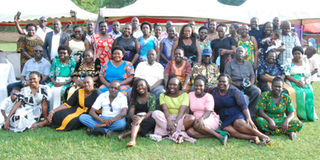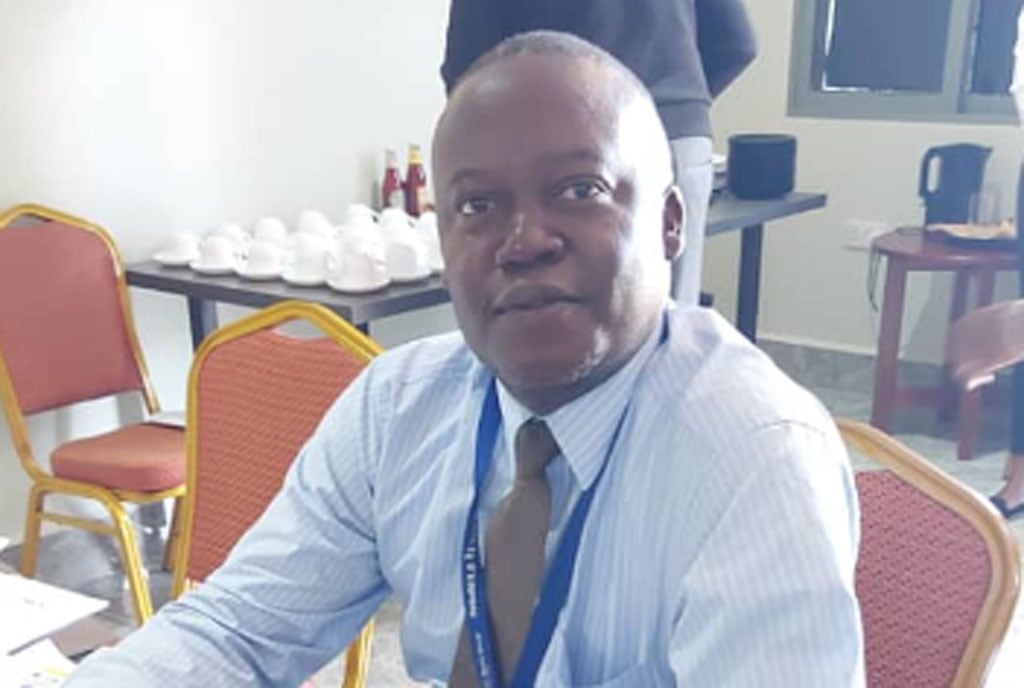Prime
Using memorial ceremonies to bring family members together

Members of the Wejuli extended family pose for a picture during the memorial. Photos | Philip Wafula.
What you need to know:
- BUSIA: December is synonymous with get togethers. Some are planned annual events that see families within the country and those out return to catch up and plan a year ahead as a family. While others are memorials, that still re-unite the family, writes Philip Wafula.
Over 300 direct descendants of the late Rev Can Kezironi Wejuli on December 17 descended on Busumba Village, Dabani Sub-county in Busia District to remember those who have departed over the years.
These include the patriarch, who passed away in November 1978, his wife Abisagi Nekesa Wejuli, children Joel Wesonga, Paul Wanyama, Philip Wanaha, Dan David Were Wejuli, John Wafula, and Wilber Were Wabwire among others.
As I am a grandson to the patriarch, I was at the event. It was the first of its kind I had ever attended. Big. Interesting. Sobering. Enlightening. The event kicked off with prayers held under a few tents erected in the Wejuli family’s expansive well-trimmed compound overlooking the graves.
Like most such functions, there was plenty to eat and drink until late; and aware that it would be difficult to control the over 100 great grandchildren (yes, they were that many), the organising committee hired a bouncing castle to keep them busy.
Remembering loved ones
Each family which lost a member, some represented by up to 15 people, including great grandchildren, was given a few minutes to eulogize their departed one.
My sister Ms Edith Wafula, who spoke on behalf of our father, Mr John Wafula’s family, remembered him as a man of integrity, adding that she is always held in high esteem at many public offices she visits because of his integrity.
This event was held almost four years after the idea was conceived. My cousin Mr Simon (Sunny) Wejuli Wanaha, one the organisers, said the event had been on family members’ minds since 2018, adding that initial plan was to hold it in 2020 but Covid-19 struck. They then turned to 2021 but failed. Also, plans to hold individual memorial services for each of the departed ones were deemed too costly, as opposed to pooling funds and organising one joint memorial service.
At the end of the day, it was agreed that each family make a contribution to organise a joint memorial and thanksgiving service, and so the day came to pass.
Benefits
Even though the event was somber in some parts as we accorded each relative who has passed on their respects and remembered them, it was a wonderful ceremony as we got to meet uncles, aunts, cousins, nephews, nieces and many more, some of them for the first time. Like Wanaha said, such gatherings, are “support systems”, and are important for families to connect and share experiences amongst themselves, find ways to support each other and for the children to know each other.
My uncle Mr Amos Ngolobe, one of the late Rev Can Wejuli’s sons, had the same sentiments. He said a memorial service or thanksgiving is both a solemn and joyous occasion which enables family members to individually and collectively remember and pray for the departed ones.
“It brings together family members to renew love and friendship, welcome new members of the family, resolve issues within and among family members, assess family developments in the past year and plan for the next years, and also to have a meal together as a family and merry make to shake off stress,” Mr Ngolobe said.
One of the best parts of this memorial service was that many of us got to know relatives we had never met before. Wanaha talked about this, saying as cousins, we have given birth to nephews and nieces who live in different parts of the country with their parents and have never met, yet they may even be attending the same school; so, such functions are important. He was right. I met about 100 nieces and nephews for the first time that day. Mr James Okuku, the late Wanaha’s brother, was equally shocked by the number of grandchildren he had never met, adding that going forward, the joint family memorial service will be held annually.
Meeting the extended family
Ms Malka Nabwire, 9, one of the grandchildren, said before the get-together, she only knew three of her cousins, but by the time she left the village, she had interacted and blended with “several others”.

One of the grandchildren lays a wreath.
Our family chose to meet during this time of the year for this very reason. Not only does the long holiday provide time for most people to avail themselves since many are able to get days off work around this time, but it also provides an opportunity to accommodate the school-going age group. “In December, all pupils and students are on long holiday, which is ideal as you will not want to have such a function without the children,” Wanaha said.
As I had said earlier and most people seemed to feel, meeting the young ones was one of the highlights of the event.
Though there was some grief as we remembered our departed loved ones, there was also joy. Mr Mike Siayo, a grandson to the late Rev Can Wejuli, said even though the memorial brought back the “heartbreak” over the deaths, it was also “beautiful, meaningful, and uplifting”.
“It was the perfect tribute to our departed special people who continue to influence our lives to this day. The memories shared, church service and sermon were amazing. I really appreciate the togetherness of both family and friends’ effort it took to make it such a successful day.
“The personal emptiness and grief that dulls but never goes away was shared and somehow made lighter, although the interaction of friends and all living generations of the Kezironi Wejuli family throughout the day was the highlight for me. It was truly memorable,” Mr Siayo added.
A meeting that’s not a funeral
Another important reason Wanaha told us as to why the memorial was a good thing was: “The family had never had a moment like this one where it was about celebrations. Most of the gatherings had been to bury our beloved lost family members, but for me, this was a breath of fresh air for the family to reunite and reignite that long lost connection.”
He was right. If you think about it, families and relatives tend to get together in big numbers usually during sad events like funerals and burials. While family members also attend happy occasions such as weddings and baptism ceremonies, not as many people come through. But with death, everyone does their best to come and commiserate. Coming together however, should not only happen at sad times where tones are hushed, tears are flowing and grief abounds. Coming together should happen more often when there is joy, a reason to celebrate, a reason to just get together and meet, eat and be happy. It is my hope that our family will make this memorial a regular event on our calendar.
Family ties
A report by UNICEF (2004) states that the core of society is the Family that can be seen in three dimensions: firstly, as a psycho-biological unit where members are linked together by blood ties – kinship relationship, personal feelings and emotional bonds of its members; secondly, as a social unit where members live together in the same household and share tasks and social functions; and thirdly as the basic economic production unit. The family unit therefore is a basic source for strength which can fulfil or meet the financial, emotional, psychological or psycho social role for various members of the family. This can be considered to be the seat of the first integration of individuals to social life. As a result, the family is at the centre of the dynamics which affect all societies (Clark, 2018).





